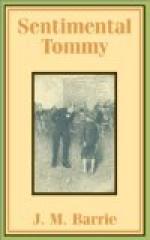“She’s dying,” said the smith.
A thread broke, and Aaron had to rise to mend it.
“Stop the mill and listen,” Auchterlonie begged him, but the warper returned to his seat and the mill again revolved.
“This is her dying words to you,” continued the smith. “Did you speak?”
“I didna, but I wish you would take your arm off the haik.”
“She’s loath to die without seeing you. Do you hear, man? You shall listen to me, I tell you.”
“I am listening, smith,” the warper replied, without rancour. “It’s but right that you should come here to take your pleasure on a shamed man.” His calmness gave him a kind of dignity.
“Did I ever say you was a shamed man, Aaron?”
“Am I not?” the warper asked quietly; and Auchterlonie hung his head.
Aaron continued, still turning the handle, “You’re truthful, and you canna deny it. Nor will you deny that I shamed you and every other mother’s son that night. You try to hod it out o’ pity, smith, but even as you look at me now, does the man in you no rise up against me?”
“If so,” the smith answered reluctantly, “if so, it’s against my will.”
“It is so,” said Aaron, in the same measured voice, “and it’s right that it should be so. A man may thieve or debauch or murder, and yet no be so very different frae his fellow-men, but there’s one thing he shall not do without their wanting to spit him out o’ their mouths, and that is, violate the feelings of sex.”
The strange words in which the warper described his fall had always an uncomfortable effect on those who heard him use them, and Auchterlonie could only answer in distress, “Maybe that’s what it is.”
“That’s what it is. I have had twal lang years sitting on this box to think it out. I blame none but mysel’.”
“Then you’ll have pity on Jean in her sair need,” said the smith. He read slowly the first part of the letter, but Aaron made no comment, and the mill had not stopped for a moment.
“She says,” the smith proceeded, doggedly—“she says to say to you, ’Aaron Latta, do you mind yon day at Inverquharity and the cushie doos?’”
Only the monotonous whirr of the mill replied.
“She says, ’Aaron Latta, do you mind that Jean Myles was ower heavy for you to lift? Oh, Aaron, you could lift me so pitiful easy now.’”
Another thread broke and the warper rose with sudden fury.
“Now that you’ve eased your conscience, smith,” he said, fiercely, “make your feet your friend.”
“I’ll do so,” Auchterlonie answered, laying the letter on the webs, “but I leave this ahint me.”
“Wap it in the fire.”
“If that’s to be done, you do it yoursel’. Aaron, she treated you ill, but—”
“There’s the door, smith.”
The smith walked away, and had only gone a few steps when he heard the whirr of the mill again. He went back to the door.




